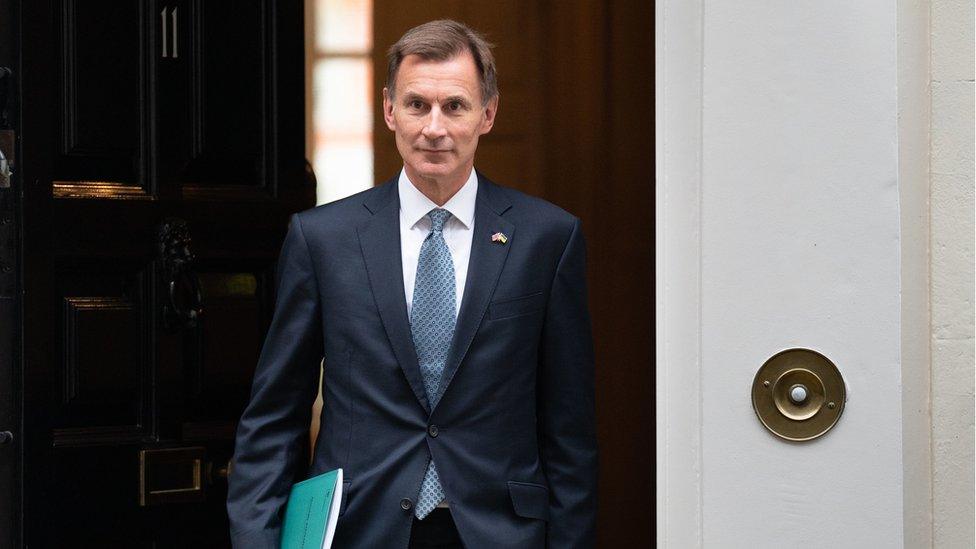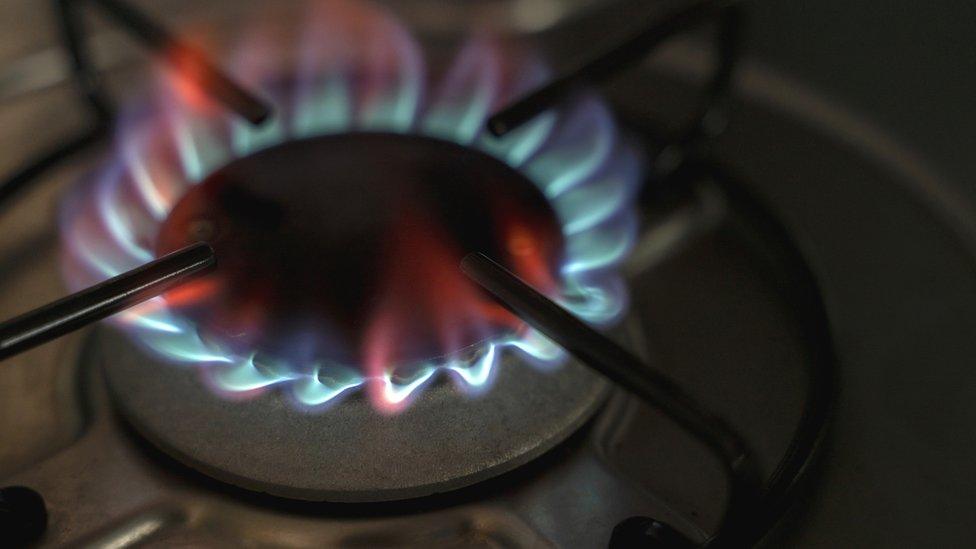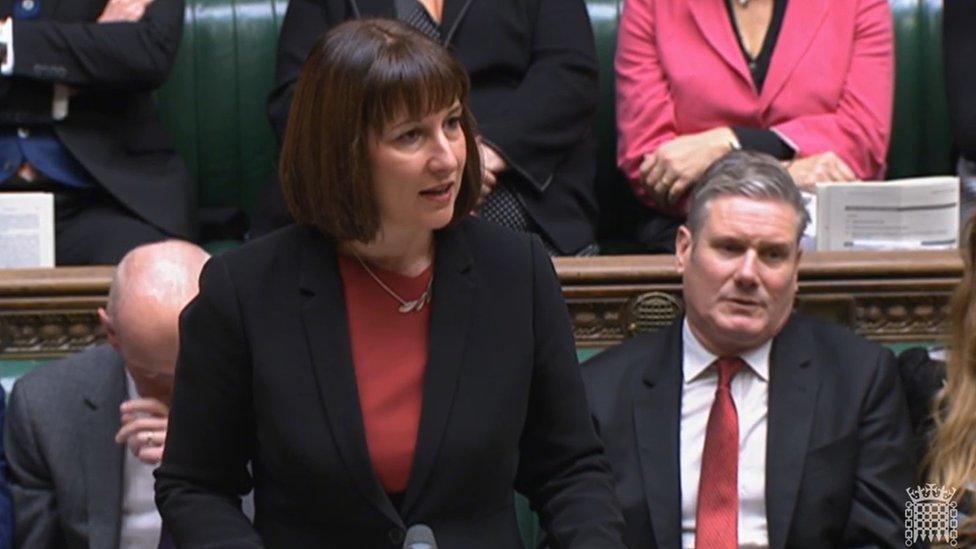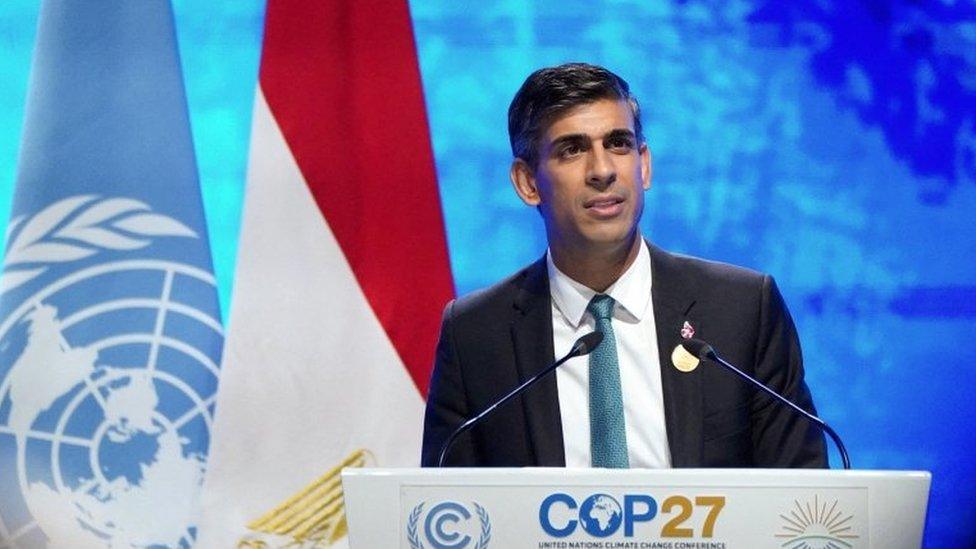Autumn Statement 2022: What's in the Chancellor's new budget, and how it might affect you
- Published
- comments

The Chancellor Jeremy Hunt on his way to reveal the details of the Autumn Statement
There's lots of talk about the Autumn Statement today, so we're here to help you understand what it is and why it's happening.
The Government is under pressure to make decisions that will tackle the rising cost of living.
Chancellor Jeremy Hunt - who is in charge of the country's cash - has revealed the government's plans for how it wants to save and spend money over the next few months.
He insisted the measures were needed to help the UK weather an economic "storm" and that his plans were "fair" and would protect the most vulnerable but critics say that what he's announced won't help enough people facing tough times.
There is lots of complicated financial information in these statements but we've pulled out three big ones to look at: Money for schools, energy and tax and benefits.
Tax and benefits

The chancellor says that people in Britain will have to pay more income tax - which is the tax adults pay on what they earn from their jobs.
There are different tax rates for people, depending on what they earn. Now the chancellor has changed some of those meaning that people who earn the most will have to pay more.
He's also frozen other levels at which adults pay tax, meaning that it's likely that more of most people's money will be taxed.
The BBC Cost of living correspondent, Kevin Peachey, says that for adults "it will almost certainly mean a greater proportion of your income is taxed."
The Chancellor also announced there'll be more money from the government for people on low incomes and claiming benefits - a payment some people can claim from the government to help with living costs.
Benefits will also rise in line with inflation, or the general price of things. It means that which means people on the lowest incomes or are more vulnerable will receive more money.
There are tax rises for some of the higher earners in the UK
The National Living Wage is being increased from April next year
Help for energy bills will be extended, but it will be less generous
Pensioners, disabled people and those on lower incomes will see some support from the government
Means-tested benefits, including Universal Credit, will rise in line with inflation
NHS budget will increase in each of the next two years by an extra £3.3 billion
Schools in England will get an extra £2.3 billion next year and the year after
Energy prices

Another subject that's got families and households up and down the UK talking is the rising cost of energy bills.
It's been confirmed by the Chancellor that a government scheme to help people pay their energy bills will be extended but won't be as generous. It also means millions of households will see their energy bills go up by hundreds of pounds.
There will also be extra payments to people who get benefits to help them pay those bills and, without help from the government, experts say energy bills would be much higher
Extra funding for schools

There was a surprise announcement about schools from the chancellor too - with a pledge to invest an billions of pounds into schools in England.
Schools in Wales, Scotland and Northern Ireland are run by their local governments, and he promised that extra money would be given to them to spend on education too.
It comes as Jeremy Hunt said: "Providing our children with a good education is not just an economic mission, it's a moral mission".
However, while there was more money for schools, other government departments have been told they will face a squeeze in how they can spend the money they will get and will have to find ways of being more "efficient" - doing the things they do now for cheaper.
What have people said?

Rachel Reeves criticised the plans in parliament
The opposition Labour Party criticised many of the announcements.
Shadow Chancellor Rachel Reeves says "far too many people" will be "wondering how they'll make ends meet" when energy bills are set to rise again next spring.
Ms Reeves also said that Mr Hunt's plans "have picked the pockets of purses and wallets of the entire country".
Some charities have criticised the plans for change to the support for energy bills with many vulnerable people are now at more risk of being "left out in the cold".
Adam Scorer, chief executive at National Energy Action, said that the help would now "be shorter lived and less helpful".
And referring to the impact of the plans put in place by previous Prime Minister Liz Truss, the Liberal Democrat Party described the Autumn Statement as a "cost-of-chaos budget", with everyone was "being forced to pay the price for this Conservative government's incompetence".
- Published8 November 2022

- Published16 November 2022

- Published8 November 2022

